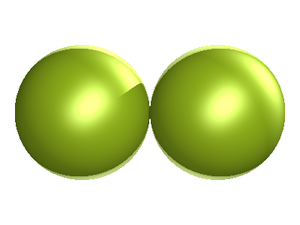Hard dumbbell model: Difference between revisions
Jump to navigation
Jump to search
Carl McBride (talk | contribs) mNo edit summary |
mNo edit summary |
||
| Line 2: | Line 2: | ||
[[Image:dumbell_peagreen.png|thumb|right|Representation of a tangential dumbbell model]] | [[Image:dumbell_peagreen.png|thumb|right|Representation of a tangential dumbbell model]] | ||
The '''Hard dumbbell model''' consists of two [[hard sphere model |hard spheres]] separated by a distance <math>L</math>. | The '''Hard dumbbell model''' consists of two [[hard sphere model |hard spheres]] separated by a distance <math>L</math>. | ||
== | ==Equation of state== | ||
[[Equation of State: three-dimensional hard dumbbells | Equation of state for the hard dumbbell model]] | :''Main article: [[Equation of State: three-dimensional hard dumbbells | Equation of state for the hard dumbbell model]]'' | ||
==References== | ==References== | ||
#[http://dx.doi.org/10.1063/1.1748236 A. Isihara "Theory of High Polymer Solutions (The Dumbbell Model)", Journal of Chemical Physics '''19''' pp. 397- (1951)] | #[http://dx.doi.org/10.1063/1.1748236 A. Isihara "Theory of High Polymer Solutions (The Dumbbell Model)", Journal of Chemical Physics '''19''' pp. 397- (1951)] | ||
[[Category: Models]] | [[Category: Models]] | ||
Revision as of 12:52, 19 February 2008

The Hard dumbbell model consists of two hard spheres separated by a distance .
Equation of state
- Main article: Equation of state for the hard dumbbell model
